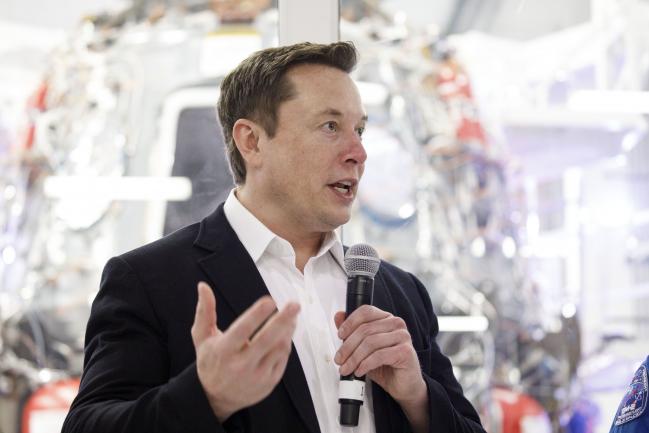(Bloomberg) -- Want the lowdown on European markets? In your inbox before the open, every day. Sign up here.
Elon Musk picked a glitzy event a few hours’ drive from the birthplace of the internal combustion engine to drop the news before some of the world’s biggest car bosses: Tesla Inc. (NASDAQ:TSLA) plans to set up shop in their backyard.
The billionaire chief executive officer announced Tuesday that Tesla will round out its global manufacturing network with a factory in Berlin. At a red carpet awards ceremony attended by the heads of BMW AG, Volkswagen (DE:VOWG_p) AG and Audi AG, he said the company will also establish an engineering-and-design center near the city’s new airport.
“Some of the best cars in the world are obviously made in Germany,” Musk said while accepting a trophy for the Model 3, which beat out BMW and Audi sedans for midsize car of the year. He said the country is “not that far behind” in electric cars, while also acknowledging that the market for them is “unproven.”
The news wasn’t completely out of left field — Musk has said before that Tesla would announce the location for a factory in Europe before the end of this year, and that Germany was a frontrunner. But it nonetheless bolstered the CEO’s flair-for-the-dramatic reputation. Fresh off a surprise profit report that sent Tesla shares surging, he threw down the gauntlet in front of rival executives that no longer dismiss his company as a niche automaker.
“Elon Musk has an ability to make a splash,” said John Boyd, principal of an eponymous manufacturing site-selection firm based in Princeton, New Jersey. “Not only does Germany bring top-level manufacturing skill sets and positive supply chain dynamics to the table, but there is a cache value to Tesla establishing a brick-and-mortar presence in Germany — a nation synonymous with precision car manufacturing.”
Making a Statement
Musk has until now relied on a single auto assembly plant in Fremont, California, to build a $63 billion company. That facility is supported by the first of the company’s so-called gigafactories near Reno, Nevada, that makes batteries. Tesla is on the verge of starting sales of Model 3s produced at its latest production facility, near Shanghai.
While adding a European factory raises the stakes for established automakers already facing a serious threat from the electric upstart, it’s likely going to take time for the plant to get up and running. Musk estimated earlier this year that Tesla’s European gigafactory probably won’t be operational until 2021.
“The Berlin location serves two unique goals,” said Gene Munster, a managing partner at venture capital firm Loup Ventures. “It’s strategic to lure German automotive talent to Tesla, and it’s a statement that Elon wants to one-up auto companies from that region.”
While the future of Germany’s electric-car market looks crowded, the politics of shifting away from the internal combustion engine also are going to be messy. Daimler AG (DE:DAIGn), the maker of Mercedes-Benz cars, is running into labor-union resistance over where future electric cars will be produced ahead of a critical meeting with investors Thursday in London. Audi, the biggest profit contributor to VW Group, faces similar fights over safeguarding employment at its main German factories that specialize in sedans and station wagons.
Chancellor Angela Merkel’s government and local automakers have agreed to boost incentives for EVs, intensifying Germany’s effort to move away from the combustion engine to reduce exhaust emissions. Still, building vehicles in a country that has some of the highest labor and energy costs worldwide is bound to be a challenge. European customers also expect a network of dealers and repair shops to reliably handle maintenance and repair work, which Tesla has struggled with lately.
Demand Boost
Adding production in Germany and China will probably help Musk boost Tesla’s sales in those regions, according to Kevin Tynan, a Bloomberg Intelligence auto analyst. “The sustainability of the demand will be more the question,” he said. “And if local competition becomes real competition, it will be more difficult.”
The Berlin government announced last week that cash incentives will jump by 50% to as much as 6,000 euros ($6,680) per electric vehicle, with the auto industry covering half the cost. The changes will take effect this month and run through 2025.
For Musk, choosing greater Berlin for a factory was “surprising but not fallacious,” said Ferdinand Dudenhoeffer director of Center for Automotive Research at the University of Duisburg-Essen. Battery-cell manufacturing requires space, infrastructure and subsidies, and the city is a good fit for a premium brand like Tesla’s, he said.
Shortly after dropping the news, Musk sent out a pair of tweets to make sure it wouldn’t be missed by his 29.3 million Twitter followers. He said the factory will make batteries, powertrains and vehicles, beginning with the Model Y crossover unveiled earlier this year.
Tesla shares finished the trading day in New York up 1.4% to $349.93, their highest close since December 2018. The stock has surged 37% since the company reported a surprise quarterly profit on Oct. 23.
